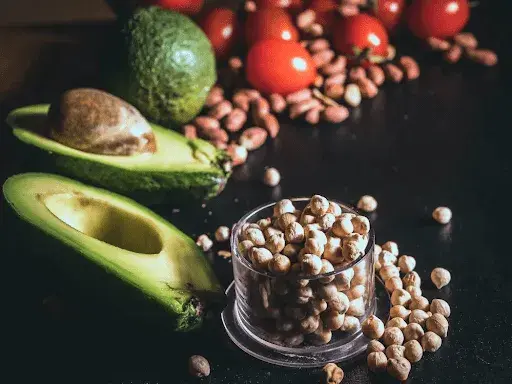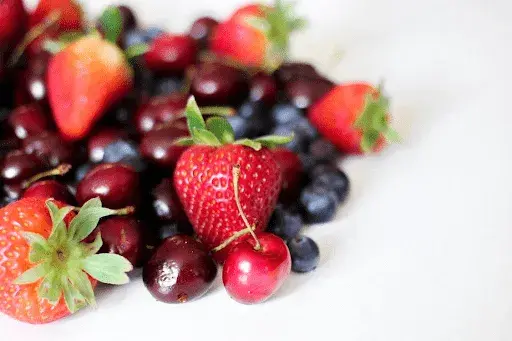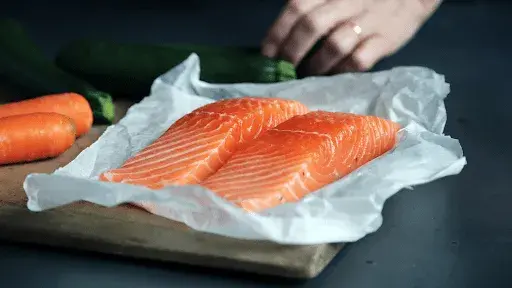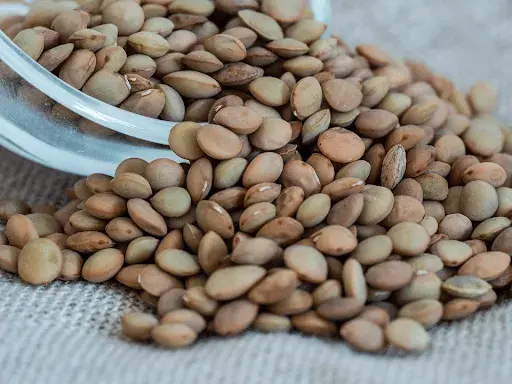Acne is a common skin condition that affects people of all ages. While numerous skincare products and treatments are available to treat acne, maintaining a healthy and balanced diet can also go a long way in preventing and managing acne. Your diet plays a vital role in the health of your skin, and consuming certain foods can help to promote clear and healthy skin. This article will discuss the top 5 foods that can help you achieve acne-free skin. Source: PexelsVitamins A and E are essential nutrients for healthy skin. Vitamin A helps to regulate the production of sebum, which is the oil that our skin produces. When sebum is produced in excess, it can clog pores and cause acne. Vitamin E is an antioxidant that helps to protect the skin from damage caused by free radicals.Foods rich in vitamin A include sweet potatoes, carrots, dark leafy greens like spinach and kale, and liver. Foods rich in vitamin E include nuts, seeds, avocados, and leafy green vegetables like spinach and broccoli. Incorporating these foods into your diet can help you achieve healthy and clear skin.
Source: PexelsVitamins A and E are essential nutrients for healthy skin. Vitamin A helps to regulate the production of sebum, which is the oil that our skin produces. When sebum is produced in excess, it can clog pores and cause acne. Vitamin E is an antioxidant that helps to protect the skin from damage caused by free radicals.Foods rich in vitamin A include sweet potatoes, carrots, dark leafy greens like spinach and kale, and liver. Foods rich in vitamin E include nuts, seeds, avocados, and leafy green vegetables like spinach and broccoli. Incorporating these foods into your diet can help you achieve healthy and clear skin. Source: PexelsFoods with a high glycemic index (GI) can cause a spike in insulin levels, which can trigger sebum production and lead to acne. On the other hand, low-GI foods are slowly digested and absorbed, which helps to keep insulin levels stable.Some low-GI foods include whole grains like oats, quinoa, and brown rice, legumes like lentils and chickpeas, and fruits like apples, berries, and grapefruit. Incorporating these low-GI foods into your diet can help to prevent acne and promote healthy skin.
Source: PexelsFoods with a high glycemic index (GI) can cause a spike in insulin levels, which can trigger sebum production and lead to acne. On the other hand, low-GI foods are slowly digested and absorbed, which helps to keep insulin levels stable.Some low-GI foods include whole grains like oats, quinoa, and brown rice, legumes like lentils and chickpeas, and fruits like apples, berries, and grapefruit. Incorporating these low-GI foods into your diet can help to prevent acne and promote healthy skin. Source: UnsplashOmega-3 fatty acids are essential fats that our bodies cannot produce alone. These fatty acids help to reduce inflammation in the body, including inflammation in the skin. Inflammation can contribute to the development of acne.Foods rich in omega-3 fatty acids include fatty fish like salmon, mackerel, sardines, flaxseed, chia seeds, and walnuts. Incorporating these foods into your diet can help reduce inflammation and promote clear, healthy skin.
Source: UnsplashOmega-3 fatty acids are essential fats that our bodies cannot produce alone. These fatty acids help to reduce inflammation in the body, including inflammation in the skin. Inflammation can contribute to the development of acne.Foods rich in omega-3 fatty acids include fatty fish like salmon, mackerel, sardines, flaxseed, chia seeds, and walnuts. Incorporating these foods into your diet can help reduce inflammation and promote clear, healthy skin. Source: UnsplashAntioxidants are compounds that protect the body from damage caused by free radicals. Free radicals are unstable molecules that can damage cells, including skin cells. Antioxidants can help to prevent this damage and keep the skin healthy.Foods rich in antioxidants include berries like blueberries, blackberries, raspberries, dark chocolate, green tea, and tomatoes. Incorporating these foods into your diet can help to protect your skin from damage and promote healthy, clear skin.
Source: UnsplashAntioxidants are compounds that protect the body from damage caused by free radicals. Free radicals are unstable molecules that can damage cells, including skin cells. Antioxidants can help to prevent this damage and keep the skin healthy.Foods rich in antioxidants include berries like blueberries, blackberries, raspberries, dark chocolate, green tea, and tomatoes. Incorporating these foods into your diet can help to protect your skin from damage and promote healthy, clear skin. Source: PixabayZinc is a mineral that is essential for the health of the skin. It helps to regulate the production of sebum and also has anti-inflammatory properties. Zinc deficiency has been linked to the development of acne.Zinc-rich foods include oysters, beef, chicken, pumpkin seeds, and lentils. Incorporating these foods into your diet can help to regulate sebum production and reduce inflammation in the skin, promoting healthy, clear skin.It is important to note that while these foods can help prevent acne, they are not a cure. If you have severe or persistent acne, it is essential to consult a dermatologist for proper treatment.
Source: PixabayZinc is a mineral that is essential for the health of the skin. It helps to regulate the production of sebum and also has anti-inflammatory properties. Zinc deficiency has been linked to the development of acne.Zinc-rich foods include oysters, beef, chicken, pumpkin seeds, and lentils. Incorporating these foods into your diet can help to regulate sebum production and reduce inflammation in the skin, promoting healthy, clear skin.It is important to note that while these foods can help prevent acne, they are not a cure. If you have severe or persistent acne, it is essential to consult a dermatologist for proper treatment.
The Skin-Saving Power of Healthy Eating: How to Keep Acne at Bay
When it comes to skincare, we often focus on the products we use externally to achieve clear, healthy skin. However, the food we eat can also profoundly impact our skin's health. Eating a diet high in processed and sugary foods can lead to inflammation, hormonal imbalances, and excess oil production, all of which can contribute to acne. On the other hand, a diet that is rich in whole, nutrient-dense foods can help reduce inflammation, balance hormones, and promote healthy skin. You can help prevent acne and maintain clear, glowing skin by making a few simple changes to your diet.The 5 Best Foods for Clear Skin
1. Vitamin A- and E-rich foods
 Source: PexelsVitamins A and E are essential nutrients for healthy skin. Vitamin A helps to regulate the production of sebum, which is the oil that our skin produces. When sebum is produced in excess, it can clog pores and cause acne. Vitamin E is an antioxidant that helps to protect the skin from damage caused by free radicals.Foods rich in vitamin A include sweet potatoes, carrots, dark leafy greens like spinach and kale, and liver. Foods rich in vitamin E include nuts, seeds, avocados, and leafy green vegetables like spinach and broccoli. Incorporating these foods into your diet can help you achieve healthy and clear skin.
Source: PexelsVitamins A and E are essential nutrients for healthy skin. Vitamin A helps to regulate the production of sebum, which is the oil that our skin produces. When sebum is produced in excess, it can clog pores and cause acne. Vitamin E is an antioxidant that helps to protect the skin from damage caused by free radicals.Foods rich in vitamin A include sweet potatoes, carrots, dark leafy greens like spinach and kale, and liver. Foods rich in vitamin E include nuts, seeds, avocados, and leafy green vegetables like spinach and broccoli. Incorporating these foods into your diet can help you achieve healthy and clear skin.2. Low Glycemic Index Foods
 Source: PexelsFoods with a high glycemic index (GI) can cause a spike in insulin levels, which can trigger sebum production and lead to acne. On the other hand, low-GI foods are slowly digested and absorbed, which helps to keep insulin levels stable.Some low-GI foods include whole grains like oats, quinoa, and brown rice, legumes like lentils and chickpeas, and fruits like apples, berries, and grapefruit. Incorporating these low-GI foods into your diet can help to prevent acne and promote healthy skin.
Source: PexelsFoods with a high glycemic index (GI) can cause a spike in insulin levels, which can trigger sebum production and lead to acne. On the other hand, low-GI foods are slowly digested and absorbed, which helps to keep insulin levels stable.Some low-GI foods include whole grains like oats, quinoa, and brown rice, legumes like lentils and chickpeas, and fruits like apples, berries, and grapefruit. Incorporating these low-GI foods into your diet can help to prevent acne and promote healthy skin.3. Omega-3 Fatty Acids
 Source: UnsplashOmega-3 fatty acids are essential fats that our bodies cannot produce alone. These fatty acids help to reduce inflammation in the body, including inflammation in the skin. Inflammation can contribute to the development of acne.Foods rich in omega-3 fatty acids include fatty fish like salmon, mackerel, sardines, flaxseed, chia seeds, and walnuts. Incorporating these foods into your diet can help reduce inflammation and promote clear, healthy skin.
Source: UnsplashOmega-3 fatty acids are essential fats that our bodies cannot produce alone. These fatty acids help to reduce inflammation in the body, including inflammation in the skin. Inflammation can contribute to the development of acne.Foods rich in omega-3 fatty acids include fatty fish like salmon, mackerel, sardines, flaxseed, chia seeds, and walnuts. Incorporating these foods into your diet can help reduce inflammation and promote clear, healthy skin.4. Antioxidant-rich Foods
 Source: UnsplashAntioxidants are compounds that protect the body from damage caused by free radicals. Free radicals are unstable molecules that can damage cells, including skin cells. Antioxidants can help to prevent this damage and keep the skin healthy.Foods rich in antioxidants include berries like blueberries, blackberries, raspberries, dark chocolate, green tea, and tomatoes. Incorporating these foods into your diet can help to protect your skin from damage and promote healthy, clear skin.
Source: UnsplashAntioxidants are compounds that protect the body from damage caused by free radicals. Free radicals are unstable molecules that can damage cells, including skin cells. Antioxidants can help to prevent this damage and keep the skin healthy.Foods rich in antioxidants include berries like blueberries, blackberries, raspberries, dark chocolate, green tea, and tomatoes. Incorporating these foods into your diet can help to protect your skin from damage and promote healthy, clear skin.5. Zinc-Rich Foods
 Source: PixabayZinc is a mineral that is essential for the health of the skin. It helps to regulate the production of sebum and also has anti-inflammatory properties. Zinc deficiency has been linked to the development of acne.Zinc-rich foods include oysters, beef, chicken, pumpkin seeds, and lentils. Incorporating these foods into your diet can help to regulate sebum production and reduce inflammation in the skin, promoting healthy, clear skin.It is important to note that while these foods can help prevent acne, they are not a cure. If you have severe or persistent acne, it is essential to consult a dermatologist for proper treatment.
Source: PixabayZinc is a mineral that is essential for the health of the skin. It helps to regulate the production of sebum and also has anti-inflammatory properties. Zinc deficiency has been linked to the development of acne.Zinc-rich foods include oysters, beef, chicken, pumpkin seeds, and lentils. Incorporating these foods into your diet can help to regulate sebum production and reduce inflammation in the skin, promoting healthy, clear skin.It is important to note that while these foods can help prevent acne, they are not a cure. If you have severe or persistent acne, it is essential to consult a dermatologist for proper treatment.Can Supplements Make a Difference in Acne Treatment
Research suggests that certain vitamins and minerals, including zinc, vitamin A, vitamin E, and vitamin D, may help to improve acne symptoms by reducing inflammation and regulating sebum production.The question of "does creatine cause acne?" is still a matter of debate for some, although there is no proven connection between creatine and acne. Confusion between creatine and anabolic steroids, which can cause acne, may be one reason why people think creatine causes acne. In fact, creatine may have benefits for the skin, including reducing sagging skin, wrinkles, and sun damage. Still, it is crucial to be cautious when using supplements and always speak with a healthcare provider before starting a new regimen. Your healthcare provider can help you determine which supplements may be right for you and which ones to avoid to prevent potential adverse effects like acne breakouts.Key Takeaways
A healthy diet with these top 5 foods for clear skin can help you achieve healthy skin and prevent acne. Incorporating these foods into your diet can help to regulate sebum production, reduce inflammation, and protect your skin from damage caused by free radicals. It is important to remember that everyone's skin is different, and what works for one person may not work for another. If you have persistent or severe acne, it is essential to seek the advice of a dermatologist for proper treatment. Categorized into General Health

Reviewed by







